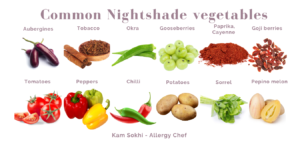Nightshade vegetables, part of the Solanaceae family, include common foods like tomatoes, potatoes, eggplants, and bell peppers. These nutrient-packed foods are staples in many diets, but they spark debate in health circles, particularly regarding their potential impact on inflammation and autoimmune conditions. Some believe nightshades worsen symptoms in people with conditions like arthritis or inflammatory bowel disease (IBD). This article explores the health benefits of nightshades, examines their associated risks, and provides guidance for individuals who may need to limit or avoid them due to sensitivities or underlying health conditions.
What Are Nightshades?

Nightshades belong to the Solanaceae family, which includes over 2,000 species. However, only a few are commonly consumed, such as tomatoes, potatoes (excluding sweet potatoes), eggplants, bell peppers, and goji berries. Despite their potentially ominous name, these foods provide essential nutrients, including vitamins, minerals, and antioxidants that support overall health. Interestingly, many nightshades are botanically classified as fruits. Tomatoes, eggplants, and peppers develop from the flowering part of the plant and contain seeds, which makes them fruits. Potatoes, however, are considered vegetables because we eat the root, even though they belong to the same family.
Are Nightshades Bad for You?
Health concerns about nightshades stem from the alkaloids they contain, such as solanine in potatoes. These naturally occurring compounds act as a defense mechanism against pests. In high concentrations, they can be toxic, causing symptoms like nausea, headaches, and digestive issues. However, the alkaloid levels in commonly consumed nightshades are generally low and not harmful to most people. For example, green or sprouted potatoes contain higher levels of solanine and should be avoided, but properly prepared nightshades pose no significant risk.
Some people believe nightshades can trigger or worsen inflammation, especially in those with autoimmune conditions like arthritis, inflammatory bowel disease (IBD), or irritable bowel syndrome (IBS). While this is a common belief, scientific evidence linking nightshades directly to inflammation remains limited and controversial.
Benefits of Nightshade Vegetables
Nightshades offer numerous health benefits when included in a balanced diet, thanks to their nutrient content.
Rich in Nutrients
Nightshades provide essential vitamins and minerals:
- Tomatoes are high in vitamin C and lycopene, an antioxidant that may help reduce the risk of cancer and heart disease.
- Bell peppers are packed with vitamin C, offering more than the recommended daily intake in just one serving.
- Eggplants are a great source of dietary fiber, which aids digestion and supports heart health.
- Potatoes (especially with their skins) are rich in potassium, vitamin B6, and manganese.
Antioxidant Properties
Nightshades also contain antioxidants such as lycopene, anthocyanins, and capsaicin. These compounds help neutralize free radicals, reducing oxidative stress and lowering the risk of chronic diseases like cancer and diabetes. For example, lycopene in tomatoes is linked to a reduced risk of prostate cancer, while anthocyanins in eggplants may protect against cellular damage.
Supports Digestive Health
Nightshades are high in fiber, which promotes healthy digestion by supporting regular bowel movements and a balanced gut microbiome. This makes them beneficial for digestive health and helps prevent constipation and other gastrointestinal issues.
Heart Health
Potassium found in nightshades plays a crucial role in regulating blood pressure and supporting cardiovascular health. Consuming potassium-rich foods like potatoes and bell peppers regularly may help lower the risk of hypertension and stroke.
Weight Management
Because nightshades are low in calories and high in fiber, they promote feelings of fullness, which can help reduce overeating and support weight management. Including these vegetables in meals can aid in maintaining a healthy weight.
Who Should Avoid Nightshade Vegetables?
While nightshades benefit most people, some may need to limit or avoid them. Those with autoimmune conditions, such as rheumatoid arthritis, psoriasis, or inflammatory bowel disease (IBD), may find that nightshades worsen their symptoms. However, not everyone with these conditions reacts the same way, and many individuals can consume nightshades without issue. People sensitive to alkaloids or capsaicin, the compound responsible for the heat in chili peppers, may experience digestive discomfort, including heartburn or an upset stomach.
If you suspect nightshades cause symptoms like joint pain, digestive problems, or skin issues, it’s a good idea to eliminate them from your diet for a few weeks. After reintroducing them, monitor your body’s response. If symptoms worsen, it could indicate a sensitivity or intolerance.
How to Minimize the Risks of Nightshade Vegetables
If you enjoy nightshades but are concerned about their alkaloid content, follow these steps to minimize risks:
- Peel potatoes: Peeling potatoes removes up to 70% of alkaloids like solanine, which are concentrated in the skin. Store potatoes in a cool, dark place to prevent sprouting and minimize alkaloid production. Baking or frying at high temperatures is more effective at reducing alkaloid content than boiling.
- Handle tomatoes carefully: While tomatoes have relatively low alkaloid levels, sensitive individuals may still experience discomfort. Opt for ripe, fresh tomatoes and avoid those with blemishes or a greenish tint, which may indicate higher solanine levels.
- Prepare eggplants and bell peppers with care: Eggplant skins contain trace amounts of solanine. Removing the skin and cooking them thoroughly helps reduce alkaloid content. Although bell peppers generally contain fewer alkaloids, wash them thoroughly to reduce pesticide residue.
By following these precautions, you can continue to enjoy nightshades while minimizing potential risks.
Conclusion
Nightshade vegetables are packed with essential nutrients and offer a range of health benefits when consumed in moderation. They provide vitamins, minerals, and antioxidants that support overall health. However, individuals with sensitivities or autoimmune conditions should exercise caution when consuming them, as they may exacerbate symptoms. If you experience negative effects after eating nightshades, consider temporarily removing them from your diet and consulting a healthcare provider. For most people, nightshades can be a healthy and beneficial addition to a balanced diet.
 Food Manifest
Food Manifest 


















